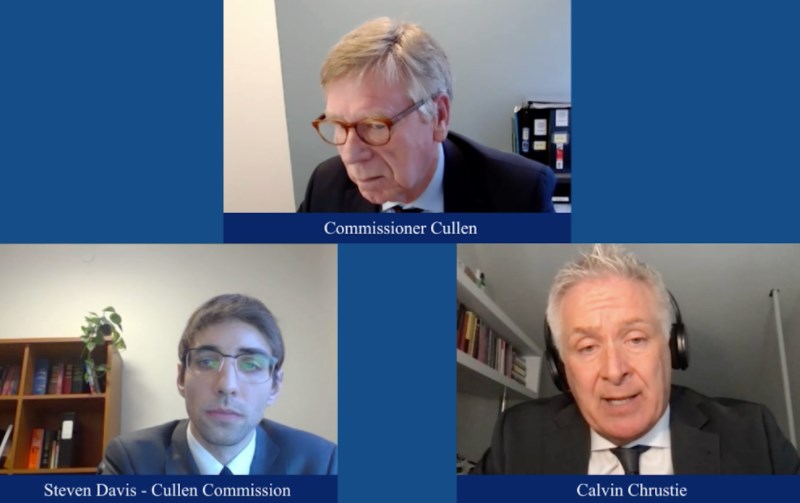Around the time of the 2010 Winter Olympic Games, Vancouver had become a convergence zone for Mexican cartels, Chinese triads and Iranian terrorist groups – thus delaying an under-funded, poorly-structured RCMP from making headway on money laundering in B.C. casinos, a retired Mountie told a public inquiry Monday.
Former RCMP senior operations officer and transnational organized crime (TNOC) investigator Calvin Chrustie also told the Commission of Inquiry into Money Laundering in B.C. that Canada ought to create a new law enforcement agency, such as the U.S. Drug Enforcement Agency, to work with international partners in enforcing cross-border crime and money laundering, which are “two sides of the same coin.”
Chrustie told commissioner Austin Cullen of how he joined the RCMP Integrated Proceeds of Crime (IPOC) unit in 2010 and proposed an investigation into casinos in 2012, shortly before the unit was disbanded and wrapped into the broader Federal Serious and Organized Crime (FSOC) unit. The move was preceded by the 2009 disbandment of the Illegal Gaming Enforcement Team (IGET).
While at IPOC and FSOC, Chrustie said he tracked high-level organized crime members, including those connected to El Chapo Guzman, Hezbollah and Chinese triads, in Vancouver.
“I saw those crime groups evolving and more importantly collaborating as a collective,” said Chrustie. “There appeared to be a convergence of these three networks dominating the Vancouver area.”
He said criminals depicted in the popular Netflix series Narcos have used Vancouver as a trading post for high-grade cocaine.
Vancouver is “a significant place in terms of capacity as a redistribution hub,” due to the size of its port. (He didn’t mention that Canada has no designated port police.)
With that said, Chrustie was tasked with explaining how the RCMP seemingly failed to immediately respond to growing concerns from provincial gambling regulators and investigators that organized crime was also using local casinos to launder proceeds of Vancouver’s illicit drug trade.
It came down to limited resources for the federal agency, he said. Simply put, the three criminal networks were moving “massive” amounts of money through Vancouver elsewhere, including via an encrypted financial network. And a recent gang war had broken out, he added.
Thus, Chrustie said, there were “resourcing problems” and tackling casino-driven money laundering came down to a cost-benefit analysis.
But why?
Chrustie said his boss Barry Baxter raised concerns about illegal activity at casinos in 2011.
“I remember there was ongoing dialogue at the highest level of the RCMP in the province …with the provincial government.
“I don’t know what took place in those rooms but I do know it was identified as an issue by Mr.Baxter at that time and obviously [the Gaming Policy and Enforcement Branch] at the time.”
Baxter has previously spoken to media on the matter and is scheduled to testify April 8. Another person scheduled to testify is Peter German, an ex-BC RCMP deputy commissioner in 2011. German wrote a report for the BC NDP in 2018 titled Dirty Money, which outlines the carousel of past and present RCMP units supposedly tasked with handling money laundering in casinos. No politicians are scheduled, to date.
By 2015, the matter finally became the subject of an investigation dubbed E-Pirate, which led to charges against two operators of an illegal underground “money service business” in Richmond called Silver International. However, those charges were stayed in November 2018 following a procedural error; subsequently, in September 2020, one of the operators was shot to death in a sushi restaurant.
Chrustie said, “It was somewhat obvious to everyone in 2012 that the money was illicitly generated” by observing activity such as casino parking lot drop-offs of duffle bags full of $20 bills.
Although Chrustie was initially focused on TNOC, it became apparent, regardless of dedicated resources at the time, that organized crime was utilizing casinos.
“The magnitude of money…associated with the triads; that was new.”
As it turned out, what seemed like harmless wealthy Chinese businessmen gambling at casinos was actually, as alleged by officials, an organized criminal network funnelling local drug cash to those gamblers, who would repay the loans back in China or with local assets such as real estate.
Chrustie said money laundering through regulated agencies, such as casinos, posed greater risks of corruption and political destabilization.
Chrustie told the inquiry Canada needs to create an independent agency to address transnational organized crime. Part of the reason is the RCMP has too many tasks and members move around too much.
“The expertise needs to be retained in federal policing and people float back and forth between business lines (different units).”
And, “you can’t be [investigating] TNOC criminals and be reporting up to people who are homicide experts and expect that they have an appreciation of the complexities.
“That’s why I kind of think there needs to be a separate entity,” he said.
Chrustie was asked several times about the RCMP track record on prosecuting criminals who launder money. While actual money-laundering prosecutions have been scant, he said the RCMP was helping the international law enforcement community. If anything, he said Canadian laws have hampered investigations, citing court requirements for wiretaps.
The inquiry is provincially mandated and thus only addresses money laundering from the perspective of provincial regulations, such as with gambling, real estate, and luxury goods sales.
So far, the inquiry has heard of failures at GPEB and the B.C. Lottery Corporation to adequately address seemingly routine deposits of suspicious cash for years. However, a major component of the response to the alleged crimes includes law enforcement, which is where the federal RCMP comes into play.
How the RCMP and federally regulated banks address money laundering elsewhere is not part of the inquiry mandate, and Commissioner Cullen has expressed frustration at what he calls inadequate cooperation by the federal government.




